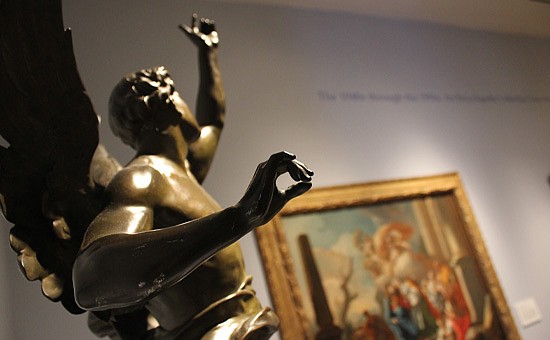- April 4, 2025
-
-
Loading

Loading

In a year, if all goes according to plan, the Cornell Fine Arts Museum at Rollins College will offer a completely different experience to visitors.
Sunlight will still trickle in the front windows, splashing the room with warmth and shining on priceless works. A walk through the galleries will still show you art ranging from hundred-year-old realistic oil portraits and historical engravings to incredibly abstract Salvador Dali pieces.
The Cornell Fine Arts Museum is located on the Rollins College campus at 1000 Holt Ave. in Winter Park. The museum has free admission, and offers free docent-led conversational tours Saturdays and Sundays at 1 p.m. Museum Director Ena Heller would like to hear from the community on how to make your experience better and more educational. Let them know what you’d like to see more of, by calling 407-646-2526, or emailing Sandy Todd at STodd@rollins.edu. Visit www.rollins.edu/cfam for more information.
But the glowing touch screens adorning the walls beside the artworks will beckon you into the future. Danny Powell, the curator of education for the museum’s K-12 programming, along with Bruce A. Beal Director Ena Heller, want to take the museum into the wireless age. By the end of the year, Powell said they’ll have a digital scavenger hunt to engage kids and audio tours for different age groups. Other possibilities are cell phone applications for the museum and digital games for children to play.
What they’re really excited about, though, is their plan to hang up touch screen devices, possibly iPads Heller said. First, they’d be hung next to the works in the front teaching gallery, and then next to permanent pieces. They plan to have the screens give visitors information about the artist and more of their work, a behind-the-scenes look at how a piece is created, historical and social context information about when it was made, and other pieces like it.
The devices would enrich the educational programs CFAM already has, and add to Heller’s teaching philosophy.
“Not telling people what they should think, but teaching them how to look,” she said.
The new team — both Heller and Powell have been at CFAM for less than a year — has also revitalized programming that had been discontinued for six months. Powell has been responsible for bringing back the museums school class tours and the CFAMilies program. Both give students and parents a tour and art related activity.
Powell said he loves building interest in art early on.
“Get me out here in front of the kids, that’s where the real work happens,” he said. “Kids may not be getting exposed to art at school, this might be their only exposure — this has to be special.”
Powell leads many of the tours himself, striving to get the kids to look at art in a deeper, more critical way. He reminds himself that not many concepts are too abstract or challenging if explained the right way. Art helps to tell the human story, he said, and even a Facebook page is just people curating their own lives, which is a lesson that teenagers can relate to immediately. And teens are some of the museums toughest critics, Heller said, but Powell reaches them.
“When you do something with passion it always shows,” she said. “He motivates the kids to participate.”
“It takes a creative mind to catch the attention of students, to pull them in,” said Mandy McRae, a Rollins junior and docent at the museum.
For the younger kids, Powell can be seen teaching the importance of the “Florida’s Useable Past” exhibit, featuring watercolor renderings of everyday objects such as vases, clothing and dolls. What the kids paint or draw instead are their treasured keepsakes brought from home: toy cars, stuffed animals and iPods. They surprise him with their insight into the art and questions on every tour.
“Kids are uninhibited, their mind wanders and takes them places,” he said. “Everything they’re looking at is new … they’ll take you down a path that is amazing.”
Powell and Heller also aim to bring more of the community into the museum, which has free admission and tours. They’d like a few more visitors like Jay Yellen, a mathematics professor at Rollins who comes to the museum a few times a week. The people and the paintings there have become old friends of Yellen’s, and it’s a place for him to escape work and stress for a little while.
“It’s a wonderful refuge,” Yellen said. “Embracing the arts makes you feel better, it enhances one’s life.”